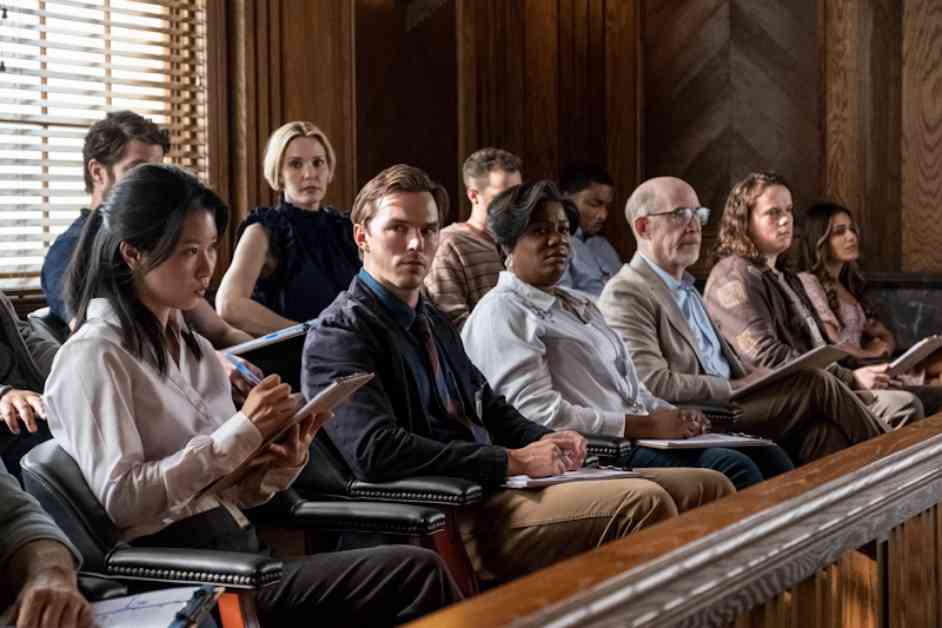Examining Honesty in the Jury Pool: ‘Juror #2′ Study
In the legal world, honesty is considered a cornerstone of the justice system. The impact of a single omission or falsehood can have far-reaching consequences, as highlighted in Clint Eastwood’s film, Juror #2. Released with limited fanfare in November and now available on Amazon Prime, the movie delves into the complex issue of juror honesty and its implications for upholding the rule of law.
Starring Nicholas Hoult as Justin Kemp, a recovering alcoholic grappling with personal challenges, the film weaves a narrative that challenges viewers to confront their own moral compass. As a trial lawyer with decades of experience, I found myself drawn to the nuanced portrayal of the legal system’s reliance on the integrity of jurors.
A Complicated Trial Unfolds
The storyline unfolds with Justin Kemp receiving a jury summons amid his wife’s high-risk pregnancy. His disclosure of this personal situation during jury selection sets the stage for a riveting trial involving grave accusations. The defendant, James Michael Sythe, portrayed by Gabriel Basso, stands accused of murdering his girlfriend, Kendall Carter, played by Francesca Eastwood, following a night of heavy drinking and a heated argument.
As the trial progresses, Justin Kemp grapples with a shocking realization—he may have been at the same bar on the night of the alleged murder. His internal turmoil intensifies as he reflects on a past incident where his car struck something on a dark, rainy night, eerily mirroring the circumstances of Kendall Carter’s demise.
The moral dilemma facing Juror #2 is palpable. Should he confront his past actions and potentially alter the course of the trial, or remain silent and allow justice to unfold as dictated by the legal proceedings? The film masterfully explores the weight of honesty in the face of uncertainty and personal guilt.
Navigating Truth and Integrity
The theme of honesty in the jury pool resonates deeply with my experiences as a defense attorney. The delicate balance between transparency and personal biases among jurors is a critical aspect of a fair trial. While the legal system relies on jurors to uphold their oath of truthfulness, the reality often reveals a more complex picture.
Jurors, like all individuals, grapple with internal conflicts and hidden biases that can influence their decision-making. Despite the solemn commitment to impartiality, the human tendency to conceal uncomfortable truths or misconceptions can impact the outcome of a trial. The veneer of objectivity often masks a myriad of personal experiences and beliefs that shape a juror’s perspective.
The Forgotten Fifth Amendment
In my legal career, I have encountered numerous instances where jurors’ preconceptions and misinterpretations have clouded their judgment. The case of a child sex crimes trial stands out as a stark reminder of the power of misconceptions in the jury room. Despite explicit instructions to refrain from drawing negative inferences from the defendant’s decision not to testify, jurors succumbed to their biases, leading to an unjust conviction.
This poignant example underscores the fragility of the legal system when confronted with human fallibility. Jurors, tasked with the weighty responsibility of determining a defendant’s fate, must navigate a complex web of emotions, experiences, and societal norms that can influence their decision-making process.
A Call for Reflection
As Juror #2 poignantly illustrates, the pursuit of truth and integrity within the jury pool is an ongoing challenge that demands introspection and vigilance. The film’s exploration of honesty, guilt, and the moral quandaries faced by individuals tasked with dispensing justice serves as a poignant reminder of the inherent complexities of the legal system.
Ultimately, the success of the justice system hinges on the unwavering commitment to transparency, fairness, and accountability among jurors. Each trial presents an opportunity for jurors to rise above personal biases and preconceptions, embodying the principles of justice and truth that form the bedrock of our legal system.
In conclusion, Juror #2 offers a compelling narrative that prompts viewers to reflect on the enduring significance of honesty in the pursuit of justice. The film’s exploration of moral dilemmas, personal integrity, and the human capacity for self-deception serves as a poignant reminder of the profound impact of individual choices on the fabric of society.
Adam Banner, a seasoned criminal defense attorney and legal expert, encapsulates the essence of Juror #2’s message: the quest for honesty and integrity in the jury pool is an ongoing imperative that resonates with the very essence of justice and fairness in our legal system. Through his insightful commentary and real-world experiences, Banner sheds light on the intricate interplay between truth, bias, and the pursuit of justice that defines the legal landscape.















